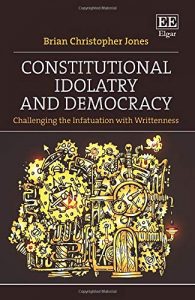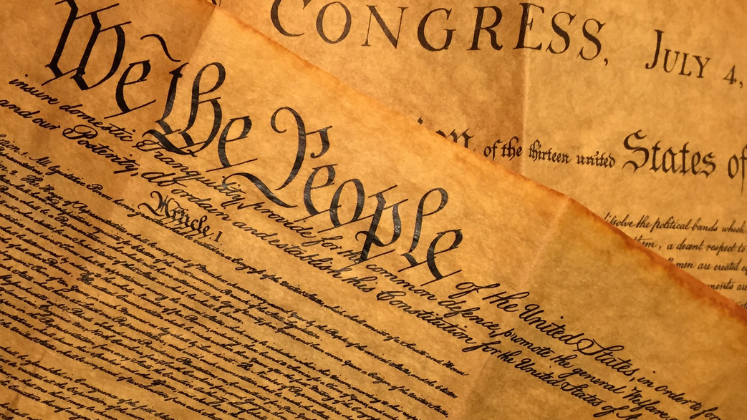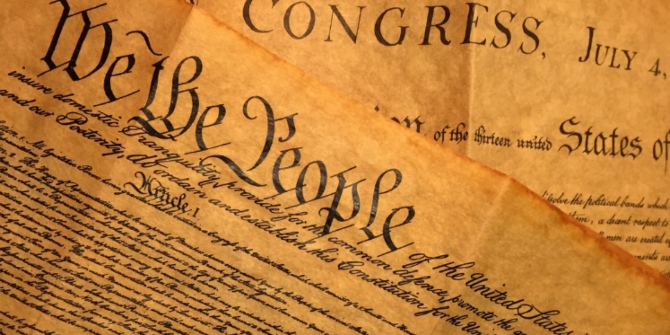In Constitutional Idolatry and Democracy: Challenging the Infatuation with Writtenness, Brian Christopher Jones contests the claim that a written constitution would benefit UK democracy to instead make the case for a more holistic interpretation of constitutional efficacy. This is a broad, engaging and well-researched contribution to the constitutional law literature, writes William N. Brown.
Constitutional Idolatry and Democracy: Challenging the Infatuation with Writtenness. Brian Christopher Jones. Edward Elgar. 2020.
Find this book (affiliate link): ![]()
 In a broad, engaging and well-researched contribution to the constitutional law literature, Constitutional Idolatry and Democracy offers a genuinely refreshing alternative to the stale obsession with written constitutions that is all too common amongst many contemporary titles. In going against this tired status quo, author Brian Christopher Jones makes the argument for a more holistic and measured interpretation of constitutional efficacy: one grounded in civic engagement, voter representation and democracy.
In a broad, engaging and well-researched contribution to the constitutional law literature, Constitutional Idolatry and Democracy offers a genuinely refreshing alternative to the stale obsession with written constitutions that is all too common amongst many contemporary titles. In going against this tired status quo, author Brian Christopher Jones makes the argument for a more holistic and measured interpretation of constitutional efficacy: one grounded in civic engagement, voter representation and democracy.
Constitutional Idolatry and Democracy maintains a consistent narrative throughout the book: it argues that many contemporary legal scholars, judges and political actors give far too much credence to the purported benefits of codified, written constitutions. These ‘modern’, US-styled constitutions are seen to provide legal certainty to a nation, invigorate democracies with ‘We The People’ patriotism and increase civic participation amongst the wider public.
Jones offers several intriguing counterarguments to these widely held, and often misplaced, beliefs. The 2014 House of Commons report by the Political and Constitutional Reform Committee, among many others, argues that a written, ‘modern’ constitution would encourage participation in the political process. Jones, however, provides a skilful rejoinder to this commonly over-simplified argument in the excellent Chapter Five. Here, Jones conducts a comprehensive statistical analysis of voter turnout before and after major constitutional reforms, across a wide range of both civil and common law jurisdictions.

Image Credit: Pixabay
In taking data samples from, among others, the French Constitution Act of 1958, the New Zealand Constitution Act of 1986 and the UK’s (statutory) Human Rights Act of 1998, Jones highlights that constitutional reforms, amendments and written codifications actually decrease, rather than increase, voter turnout in major elections. In France’s 2007 legislative elections, for example, voter turnout was recorded at approximately 60 per cent: following the 2008 Constitutional Amendments, the turnout for the 2017 legislative elections had dropped to an embarrassing 42.64 per cent.
Jones concedes that there will have been other socio-political factors at play, such as economic stagnation, major foreign policy blunders and increasing disillusionment with the ‘political class’. His analyses nevertheless craft a compelling argument that convincingly deconstructs the over-simplifications made in some of the constitutional law literature. The notion that ‘The People’ will be reinvigorated and inspired by mere structural changes to the legal frameworks of a nation state or supranational organisation – rather than a comprehensive overhauling of entrenched political machinations – is at best naïve, at worst outright patronising. Empirical analyses such as Jones’s are often missing from some of the constitutional literature, so it is genuinely refreshing to encounter them as an excellent supplement to the theoretical arguments made in the book.
One example of these more abstract arguments can be found in Chapter Seven, where Jones focuses on what he labels ‘Constitutional Paternalism’. He argues that ‘when overreliance on the judiciary becomes the norm, constitutional paternalism by the courts inevitably develops’ (154). It is an increasingly seminal argument, and one which is shared by many scholars, such as Robert Dahl – whose work on ‘guardianship’ and the primacy of the judiciary is similarly sceptical. In a world where unelected judges in apex courts are increasingly seen as the guardians of their respective constitutions, rather than one of many delicately balanced in equilibrium, the authority and influence of the most (and, arguably, only) democratic body – Parliament – is marginalised.
As Jones articulates in the opening paragraph of Chapter Seven, ‘the protection and health of a constitutional state is a collective endeavour, and is not limited to one particular person or branch of government’ (131). When written constitutions afford an unelected judiciary the power to give themselves the authority to supersede parliamentary statute – and therefore to supersede the only real available manifestation of democratic will – democracy itself is not ‘guarded’: it is rendered impossible. To argue to the contrary would be to argue that ‘the experts know best’ – a notion that Jones correctly points out has undermined the law and constitutional efficacy since the days of Plato’s Republic (156).
There are numerous modern examples of such ‘paternalism’ undermining democratic will, the most pertinent of which is likely the Citizens United case concerning the Supreme Court of the United States (SCOTUS). Despite overwhelming public support for the plaintiffs, the court ultimately held that political donations and so-called ‘Super-PACs’ were akin to a manifestation of freedom of expression and thus protected by the First Amendment. Jones refers to this seminal case, but he could also have explored the failure of the SCOTUS ‘guardians’ in their duty to protect the position of Congress on issues such as the Obama administration’s (ostensibly unconstitutional) drone bombings, or the Trump administration’s (objectively unconstitutional) appointment of ‘acting’ Federal Officials.
Not only do ‘constitutional guardians’ under a written constitution fail insofar as they stifle their respective legislatures and the manifestation of democratic will, but they have also been seen to fail even when given the explicit authority to ‘check’ the worst possible excesses of the legislature. Perhaps the single-best historical example of such judicial failure that Jones rightly references is the rise of the Nazi Party in 1930s Germany. When Adolf Hitler rose to power following the 1932 German presidential election, the ‘guardians’ in the judiciary utterly failed in their duty to protect the German system. Embarrassingly, for all its supposed ‘modernism’ and ‘efficacy’, the Weimar Constitution simply melted into thin air when its time came to uphold the guardians and empower them against a demagogic legislature. Considering such indisputable failures, that many scholars still argue so passionately for the dissemination of written constitutions is, at times, baffling. Jones deserves particular praise for resisting such temptations and instead relying on his own conviction.
The concluding Chapter Nine summarises Jones’s arguments very well. Here, he brings together both his theoretical and empirical analyses, and again highlights the flaws in the ‘Constitutional Idolatry’ that we see across much of the literature. The chapter introduces some of the cultural and socio-political factors behind constitutional efficacy – factors such as restoring faith in politics and protecting the sovereignty of national legislatures – but concludes somewhat abruptly. Perhaps my only notable critique of this book is that the author didn’t investigate further when correctly highlighting that culture, morality and political architecture are far more important to the efficacy of a constitution than the semantics of the constitution itself.
In his final paragraph, Jones – quoting Lord Sumption – posits that ‘the habits, traditions and attitudes of human communities are more powerful than law. Indeed, they are the foundation of law’ (191). This is the argument that constitutional thinkers ought to pursue in future scholarship: as human behaviours are reflexive, so too must the law be reflexive to accommodate this – and when constitutions are designed to be axiomatic, their capacity to reflect the societies they serve is unquestionably diminished.
- This review first appeared at LSE Review of Books.
Please read our comments policy before commenting.
Note: This article gives the views of the author, and not the position of USAPP – American Politics and Policy, nor of the London School of Economics.
Shortened URL for this post: https://bit.ly/3Cylf27
About the reviewer
William N. Brown – University of Liverpool
William N. Brown is a PhD candidate in law at the University of Liverpool, and an aspiring legal academic. His research interests are in property law, constitutional law and jurisprudence, and his PhD thesis explores the dynamic between proprietary rights and civil liberties. He can be found at www.linkedin.com/in/williamnorcup-brown.



